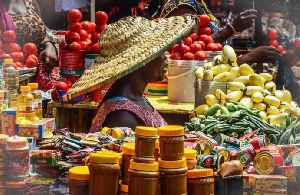The Minister of State-designate at the Finance Ministry, Abena Osei-Asare says the government’s flagship program, planting for food and jobs, is redressing the issue of food inflation in the country.
The Planting for Food and Jobs policy is an agricultural policy initiative implemented in 2017 by the current government as a reformative strategy in the agricultural sector aiming to reduce the importation of rice which is about 70% to improve the welfare of farmers in the country.
It was also implemented to combat the declining food production in the country and to help the situation of unemployment. But despite its implementation, food inflation in 2022 soared to over 50%.
However, answering a question on inflation when she took her turn at parliament’s ministerial vetting, the current deputy finance minister, emphasized that, the introduction of the planting for food and jobs policy has played a crucial role in fighting the food inflation situation bringing it down from a spiking rate of 54.1% in December 2022 to 28.7% in December 2023.
“Quickly we realized that the food component played a huge role in inflation and the government quickly put some measures in place and revived the planting for food and jobs. And so, as we speak, the food components of inflation which was around 59.7% in December 2022 has declined to 28.7% in December 2023. So clearly, we have put measures in place.”, she told the committee.
The Atiwa East MP, also insists the economy is on the right path due to the drastic and efficient measures the NPP-led government has put in place.
“We are doing everything possible Mr. Chairman. We are not there yet but we are doing everything possible to stabilize these important components of the macro economy and to make sure our people are best served in the way they need to be served”
Meanwhile, The Ghana Statistical Service has disclosed February 2024 recorded an increase in the monthly food inflation despite the country recording a drop in overall inflation for the month of February.
Over the last 12 months, both food and non-food inflation have equally slowed down marginally to 27.0% and 20.0% respectively from 27.1% and 20.5% recorded for the period of January 2023 to January 2024.
However, although Month-on-Month inflation saw some decline, as prices of goods and services between January 2024 and February 2024 went up by 1.6%, overall month-on-month food inflation for February increased from 1.6% to 2.0%.
This, according to the statistical service, is fueled by the rise in prices of vegetables, tubers, plantain as well as fish and seafood, which recorded monthly inflation of more than 3.0%.
Business News of Saturday, 16 March 2024
Source: starrfm.com.gh

















